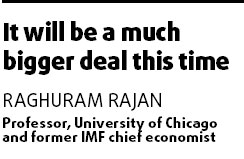'US downturn imperils global growth'
Updated: 2007-09-11 06:58
This time, when the United States sneezes, the rest of the world may well catch a cold.
Global economic growth looks likely to slow markedly in the months ahead as further weakness in the US infects Asia and Europe. That would represent a shift from the last 18 months, when the world economy proved immune to a US slowdown and grew at an annual clip of more than 5 percent.
What's different now is the US slump is starting to spread from the domestic housing market to consumers who buy imports from companies such as Toyota Motor Corp. And the sudden increase in borrowing costs that followed the collapse of the subprime-mortgage market is now showing up overseas, raising the price tag on credit worldwide.
"It will be a much bigger deal this time," said Raghuram Rajan, a former chief economist for the International Monetary Fund who's now a professor at the University of Chicago. "I don't see growth falling off a cliff, but it will slow."
If growth in the US slips below 2 percent from an average of 2.3 percent in the first half, the global economy may suffer a modest slowdown to about 4.75 percent, said forecasters at Morgan Stanley & Co, Global Insight and the Economist Intelligence Unit. The contagion from a US recession would hurt more, cutting global growth to 3.5 percent or less.
Global impact
"If we have a major problem in the US, the rest of the world will feel an impact," said Otmar Issing, former chief economist of the European Central Bank.

Faced with an unsettled global outlook, central bankers in the United Kingdom, the European Union, Canada, Australia and South Korea held back on raising interest rates last week. In the US, futures-market traders are betting that Federal Reserve Chairman Ben S. Bernanke and his colleagues will cut rates when they meet next Tuesday.
The world economy is most at risk when a shock - like the steep oil-price increases of the 1970s - hits the US and other nations simultaneously, according to an April IMF study.
That's what seems to be happening now, as global investors and lenders turn more cautious in response to rising delinquencies on loans to borrowers with patchy credit.
To be sure, the world economy is stronger than it was when turmoil last struck credit markets a decade ago, driving much of Asia into recession.
Still, there's agreement that global growth will suffer - even among some prominent Wall Street proponents of the theory that the rest of the world can "decouple" from the US, including Jim O'Neill, chief economist at Goldman Sachs Group Inc, and Stephen Jen, head of foreign-exchange research for Morgan Stanley, both in London.
No 'major hit'
While Luxembourg Prime Minister and Finance Minister Jean-Claude Juncker doesn't see a "major" hit in 2007 for the 13 nations that use the euro, "there could be a stronger impact" next year, he told reporters on Wednesday. Juncker is the chairman of a panel of euro-zone finance ministers.
Even before the latest rise in borrowing costs, some of Europe's strongest housing markets were showing signs of weakness.
Spanish home starts plunged 21 percent in May, virtually wiping out growth for the year, while Irish house prices suffered their first annual decline in at least a decade in July.
Qualceram Shires Plc, an Irish maker of ceramic bathroom sinks and toilets, said last Tuesday that its first-half profits fell 7.4 percent as cooling property markets in Ireland and the UK reduced sales.
There could be further trouble ahead. UK lenders, including Merrill Lynch & Co's Mortgages Plc unit and Deutsche Bank AG, are tightening terms on home loans, raising the cost for borrowers with less-than-perfect credit ratings.
"The same person trying to get a mortgage will find the situation more difficult now than three months ago," said Fionnuala Earley, chief economist at Nationwide Building Society, the UK's fifth-biggest home lender.
European companies also face higher costs as the region's banks become stingier with their money, said Adam Posen, a former Fed official who is now at the Peterson Institute for International Economics in Washington.
German business confidence fell to a 10-month low in August after a rise in the cost of credit, according to the Munich-based Ifo Institute for Economic Research.
While tighter credit will take a toll on Asia, the region's economies are even more vulnerable to a slowdown in US demand for their products. Consumer spending, which accounts for about 70 percent of the US economy, rose at an annual rate of 1.4 percent in the second quarter, its slowest pace in a year.
Asia is "still heavily dependent on exports", said Stephen Roach, chairman of Morgan Stanley in Asia.
Bloomberg News
(China Daily 09/11/2007 page16)
|
|
|
||
|
||
|
|
|
|